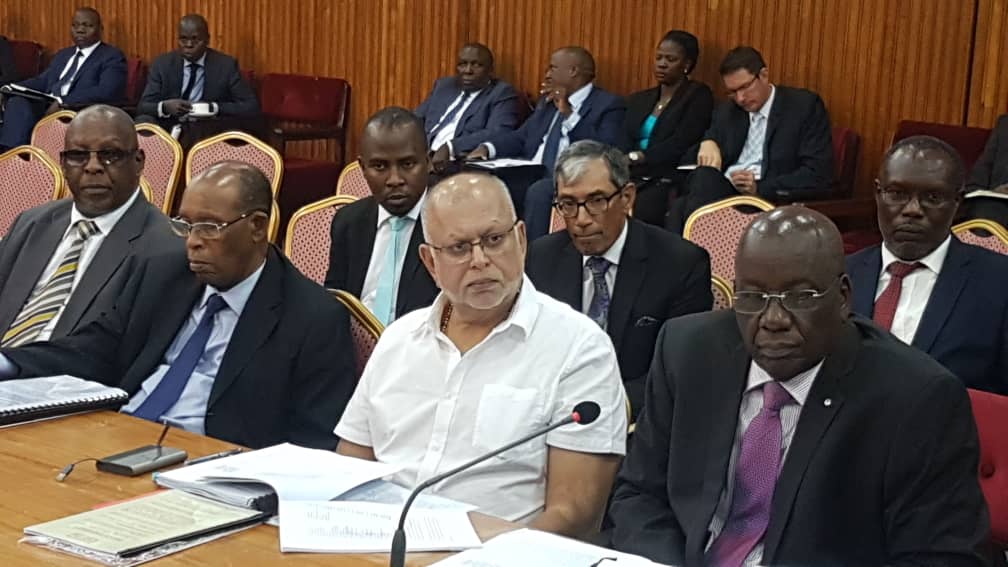Parliament’s Committee on Commissions, State Authorities and State Enterprises (COSASE) report on the controversial closure of banks by the Bank of Uganda (BoU) mentions all banks closed and makes recommendations concerning all, yet the Inspector General of Government Irene Mulyagonja has ordered the Internal Security Organisation (ISO) to investigate some of the members on the former COSASE on the allegations that they were compromised by Sudhir Ruparelia, the former majority shareholder in Crane Bank Limited (CBL).
By ordering ISO to carry out an investigation against former COSASE members, the IGG is indirectly witch-hunting the businessman given that she doesn’t not mention other former shareholders of defunct banks who want their banks compensated and reopened such those of the National Bank Of Commerce, Cooperative Bank and Greenland Bank among others.
Mulyagonja wants ISO to specifically investigate former COSASE Chairperson Abdu Katuntu, Anita Among (former Chairperson) and members Elijah Okupa and Odonga Otto on allegations of corruption and that the MPs are closer to Sudhir and his son Rajiv Ruparelia. Katuntu was further accused of receiving Shs400 million from BoU Governor Emmanuel Tumusiime-Mutebile to be used in benching the central bank with its peers and that Katuntu did not disclose the information during the probe.
Mulyagonja is believed to have ordered for an investigation against the four MPs after coming into contact with a top official from BoU. A few days ago Benedict Sekabira, BoU’s Director Financial Markets Development Coordination recently threatened Kadaga that he would go to court, saying COSASE MPs did not consider some of the documents and evidence he presented during the probe that took place from late October 2018 to late February 2019.
But as Mulyagonja wants the MPs investigated, she has failed to release a report on the alleged illicit wealth of Justine Bagyenda, the former executive director of bank supervision at BoU.
The IGG’s intervention in COSASE’s work did not go well with the Speaker of Parliament Rebecca Kadaga who said parliament will not be diverted from doing its work on mere allegations. Kadaga now wants Mulyagonja to appear before parliament to furnish the MPs with more details on the allegations against the MPs.
That aside, as a matter of concern, COSASE report which was a result of the probe, says that BoU at first agreed to sell all loan assets of Crane Bank Limited (CBL) to its rival DFCU Bank yet the bank acquired only loan book of Shs200 billion out of the Shs 500 billion, moreover the deferred payments were to be recovered from the entire loan book.
The report notes: “At the BoU Board of Directors’ sitting on 15th December 2016 it was resolved under minute no. 3754 paragraph 10, Board observations and resolutions that …the buyer of CBL would take all the assets and liabilities; and a report of a forensic audit was still awaited.”
The MPs in the report note that the board having resolved as above, it was wrong for management to agree, conclude and indeed execute a P & A that excluded some assets and liabilities, contrary to the resolutions of the board.
According to the report that has been debated in parliament BoU spent Shs478 billion as liquidity support to CBL and other intervention costs yet it could offer CBL’s assets at Shs200 billion to DFCU Bank. MPs in the report concluded that that transaction resulted in a financial loss to both BoU and CBL.
The report of the probe further notes that BoU officials later included interest on Shs200 billion on reducing balance basis, which would be recovered from the claims to be made by BoU on the CBL shareholders even as interest was never included in the P & A and the subsequent Shs200 billion liability agreement executed between BoU and DFCU Bank.
“…the Board’s resolution to charge the interest on the shareholder for money ‘lent’ to DFCU, the committee finds it inconceivable that CBL shareholders who were not party to the P & A and Shs200 billion liability agreement between DFCU and BoU would be called upon to bear the cost of negligence on the part of BoU officials,” the report continues.
The report says that by conducting the sale of CBL in a casual and informal manner, deviating from the basic principles enshrined in the Financial Institutions Act, 2004 and acting in a strange manner with the best interest of all concerned, BoU acted high handedly.
The report says BoU should bear the loss equivalent of the Shs500 billion loan book of CBL, which money should go to CBL. It adds also that BoU officials who failed to properly execute their duties in accordance with the law should be held responsible for their commissions and omissions.
The issues and recommendations above, analysts, say have angered BoU officials who were involved in the sale of CBL. The situation is worsened by the fact that BoU cannot account for some of the Shs478 billion it claims to have injected in CBL as liquidity support and other intervention costs.




